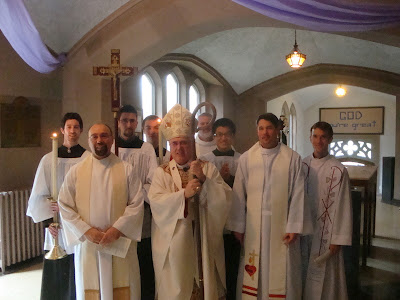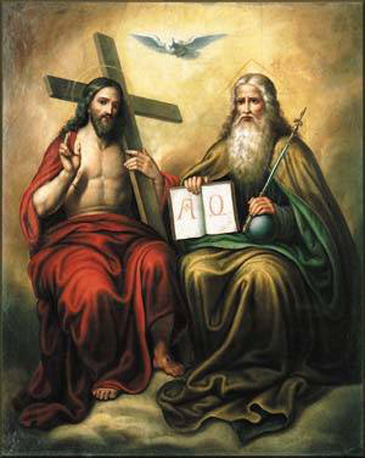The Solemnity of the Body and Blood of Christ (Year “B”) - June 10, 2012
THE RENEWAL OF GOD'S COVENANT IN JESUS' BLOOD
[Texts: Exodus 24.3-8 [Psalm 116]; Hebrews 9.11-15; Mark 14.12-16, 22-26]
On this wonderful feast this coming Sunday, I will take part with five priests and twenty laity from the Archdiocese of Ottawa in the Opening Liturgy of the
50th International Eucharistic Congress in Dublin, Ireland, which has as its theme,
The Eucharist: Communion with Christ and with One Another.
The Mass will be presided by the
Papal Legate, Cardinal Marc Ouellet, Prefect of the Congregation of Bishops, host—as Archbishop of Quebec—of the last International Eucharistic Congress in 2008.
Sunday also marks the 40th anniversary of my ordination as a priest by the late
Bishop Thomas B. Fulton, whom I will remember at Mass along with two classmates ordained with me whom the Lord has called home:
Ronald Barnes, S.J. and
Brian Massie, S.J.
* * *
During Holy Week 2012 the entire Passion Narrative was read twice, from Mark's Gospel on Passion (Palm) Sunday and from John's Gospel on Good Friday. When the entire narrative is read, the rich theological themes of the Passion come all at once and it can prove difficult to absorb more than one or two of them.
Today's solemn commemoration of Corpus Christi (the Body [and Blood] of Christ) allows for a deepened appreciation of the key mystery of Catholic belief: that in the celebration of Holy Communion, the bread and wine are changed into the Body and Blood of Christ, serving as heavenly food for the Christian to live out the teaching of Jesus on his or her journey to God's Kingdom.
There are four accounts of the institution of the Eucharist, one in each of the synoptic gospels (Matthew 26.26-30; Mark 14.22-26; Luke 22.14-20) and a fourth in Paul's first epistle to the Corinthians (11.23-27).
Close examination of the four versions shows that Luke and Paul's accounts are similar, perhaps reflecting liturgical traditions of the church at Antioch, while Mark and Matthew's resemble each other, possibly paralleling a formula used in Jerusalem.
Mark often stresses Jesus' ability to predict the future: his sufferings and subsequent glory, as well as the failure of his disciples and their reconstitution in Galilee (14.27-28). So today's gospel opens with Jesus arranging for the celebration of a Passover meal. He asked two of the disciples (Luke identified them as Peter and John [22.8]) to go into Jerusalem where they would meet a man carrying a water jar, something unusual as this was women's work.
The late Benedictine archaeologist Bargil Pixner suggested that this person was associated with the Essenes and that Jesus observed Passover according to the Qumran calendar. Since the Essene observance of Passover that year would have been a couple of days ahead of that celebrated by the rest of the Jews, this might explain the Synoptic view that the Last Supper was a Passover meal, whereas John maintains that it happened the day before Passover.
In his account of the Last Supper John's focus is on Jesus' humility in washing his disciples' feet; Johannine teaching on the Eucharist is found in the Bread of Life discourse, which will be presented this year in the Sunday readings of August.
When the stranger showed them the large upstairs room, they prepared the Passover there. Surrounding the Eucharistic words are Jesus' predictions of his coming betrayal by Judas (14.17-21) and the falling away of Peter and the rest (14.27-31). Even though his disciples fall short, Jesus promises that God's purposes will be realized in Jesus' resurrection and formation of the nascent church in Galilee (16.7).
Jesus ended his words over the bread and the cup by asserting an unshakeable conviction that, though he suffered betrayed, his act of abstaining from wine would culminate in celebration and he would commemorate a victory in the coming Kingdom: “I will never again drink the fruit of the vine until that day when I drink it new in the Kingdom of God” (14.25).
The words Jesus pronounced over the bread (“Take; this is My Body”) are sparse by comparison with the Paul/Luke tradition (“that is for you”/ “which is given for you”), but the symbolism of his breaking the bread points to the coming gift of his life on the Cross.
Jesus' words over the cup (“This is My Blood of the covenant, which is poured out for many”) echo the text from Exodus, the first reading of today's liturgy. Just as Moses had sprinkled the blood of sacrifice, half on the altar representing God and half on the people God had chosen to symbolize their union, Jesus united himself with his weak and struggling disciples by a bond that can never be broken.
The “blood of the covenant” created solidarity between two parties involved. In biblical thought, this is based on the understanding that blood is the distinctive element which makes life possible.
At Sinai, Israel began a new life of obedience, signified by the sacrificial meal offered up and acceptance of the “book of the covenant” read out by Moses and the “blood of the covenant” acted out in a marvellous liturgy. So too does the Church in the Lord's Supper.
* * * * * *
NET CANADA MASS OF THANKSGIVING
FESTIVE GATHERING
Last Saturday morning, I had the joy of going to Blessed Sacrament Parish in the Glebe for the closing of the year Mass of Thanksgiving for all the graces bestowed on the members of the seven teams of NET Canada and Les Equipes NET and, through them, for the graces poured out abundantly on the youth they encountered across Canada.
From conversation I held, I know that amily members came at least from British Columbia, Saskatchewan and from far and near in Ontario to share the day.
There was a delicious brunch, posters summarizing the activities of the teams, skits and speeches and songs. I had to leave before everything had ended, but I did manage to snap some photos of the gathering, a few of which follow:







* * * * * *
SAINT NORBERT
Archevêque, Fondateur de l'Ordre des Prémontrés (1080-1134)
Norbert, né en 1080, près de Cologne, fut engagé dès son jeune âge dans la cléricature; mais il fréquentait plus la cour que l'Église et reculait devant les Ordres sacrés, afin de suivre la voie des plaisirs.
Il avait déjà trente-trois ans, quand, traversant à cheval une belle prairie, accompagné d'un seul serviteur, il fut assailli par une soudaine et horrible tempête. La scène de saint Paul sur le chemin de Damas se renouvela; car Norbert entendit une voix céleste lui dire: "Pourquoi Me fuis-tu? Je te destinais à édifier Mon Église, et tu scandalises Mon peuple." En même temps, la foudre éclate et le renverse par terre, où il demeure évanoui pendant une heure entière. Quand il eut recouvré ses sens, il dit à Dieu: "Seigneur, que demandez-Vous de moi?" Et la réponse à sa question lui fit comprendre qu'il devait quitter le monde et vivre dans la pénitence.
La conversion fut immédiate et complète, et bientôt l'on put voir, non sans étonnement, le brillant gentilhomme échanger ses riches vêtements contre la bure du moine. Il se prépara pendant quarante jours, dans un monastère, à offrir pour la première fois le Saint Sacrifice de la Messe.
Norbert obtint du Pape les pouvoirs de missionnaire apostolique et commença à prêcher la pénitence. Ses oeuvres étaient plus éloquentes encore que sa prédication: il marchait nu-pieds, même en plein hiver, au milieu de la neige, n'avait pour vêtement qu'un rude cilice en forme de tunique et un manteau de pénitent; il observait perpétuellement le carême selon la rigueur des premiers siècles, et y ajoutait de ne manger presque point de poisson et de ne boire du vin que très rarement: on eût dit un nouveau Jean-Baptiste, par son zèle et ses austérités.
Cependant Dieu réservait à Norbert la gloire de fonder l'Ordre des Prémontrés, ainsi nommé parce que le Saint avait eu révélation du lieu où il devait l'établir. Saint Augustin lui ayant apparu, une Règle d'or à la main, il comprit qu'il devait adopter pour son Ordre la règle de ce grand docteur. Il fut lui-même la règle vivante de ses frères.
En 1126, se réalisa une vision que sa mère avait eue avant sa naissance: Norbert fut obligé d'accepter l'archevêché de Magdebourg, et il eut désormais outre le souci de son Ordre, le soin de son diocèse, où son apostolat fut traversé par de grandes persécutions et couronné d'abondants fruits de salut. Rien du reste, n'avait changé dans sa vie, et jusqu'à sa mort il mena dans son palais la vie d'un moine dans sa cellule. [Abbé L. Jaud, Vie des Saints pour tous les jours de l'année, Tours, Mame, 1950.]
* * *
O God, who made the Bishop Saint Norbert a servant of your Church, outstanding in his prayer and pastoral zeal, grant, we ask, that by the help of his intercession, the flock of the faithful may always find shepherds after your own heart and be fed in the pastures of salvation. Through our Lord Jesus Christ, your Son, who lives and reigns with you in the unity of the Holy Spirit, one God, for ever and ever.













































